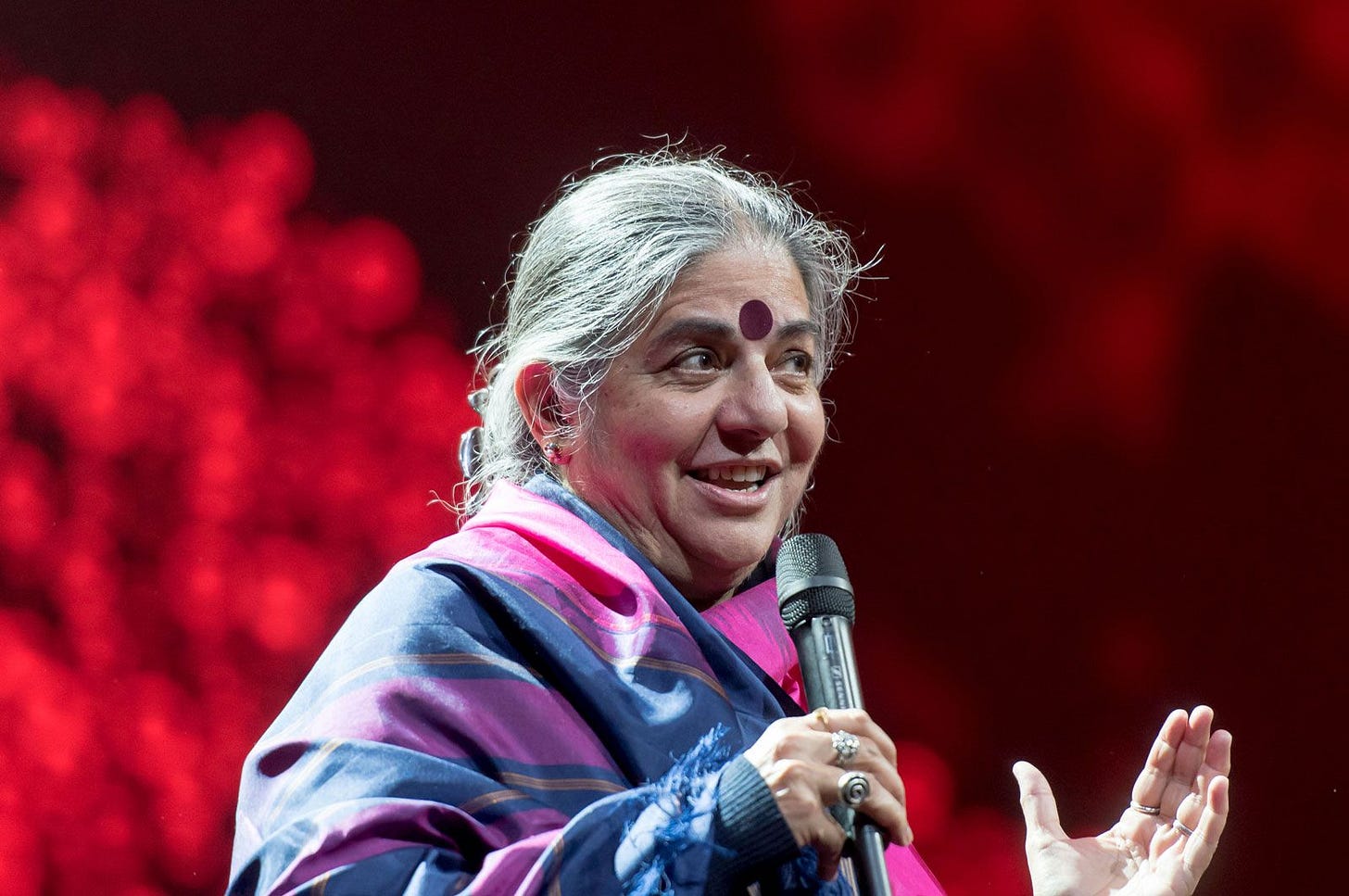Vandana Shiva: Seeds, Power, and Food Control
Imagine a world where the very essence of life – the seeds that sprout and sustain us – is controlled by a handful of corporations. Where farmers are forced to buy patented seeds year after year, losing their independence and becoming beholden to a system that prioritizes profit over people. Does this sound like a dystopian fantasy? Or is it the reality we’re edging towards? For over three decades, Vandana Shiva has been fighting against this tide, a one-woman army battling for food sovereignty and the preservation of our planet's precious biodiversity. Her story is not just about seeds; it's about power, control, and the future of what we eat.
The Seed of Resistance
Vandana Shiva’s journey began in the Himalayan forests of her childhood, a stark contrast to the industrialized world that increasingly threatened her home. Growing up amidst nature, she developed a deep respect for its interconnectedness. This foundation fueled her outrage when she witnessed the devastating effects of the Green Revolution in India, a supposedly benevolent program that introduced high-yield crops and chemical fertilizers. But at what cost? The loss of indigenous seed varieties, the erosion of soil, and the displacement of farmers. This experience sparked a fire within her, igniting her lifelong mission to reclaim the right to food and challenge the corporate dominance of our agricultural system.
What if the very building blocks of our sustenance – seeds – were weaponized? Shiva saw this unfolding before her eyes, and she wasn’t afraid to fight back.
Seeds of Change: Challenging the Giants
The battleground Shiva chose was the world of intellectual property rights and genetic engineering. She realized that the privatization of seeds, through patents, was a key strategy employed by multinational corporations to control the food supply. By patenting seeds, these companies gained the exclusive right to their use, forcing farmers to purchase them annually and prohibiting them from saving and replanting their own seeds. This cycle of dependence is at the heart of Shiva’s criticism.
Consider the implications:
Monopolization: Corporations control the market.
Dependence: Farmers are reliant on corporate supply.
Loss of Biodiversity: Fewer seed varieties are available.
Environmental Damage: Increased use of chemicals.
Her response? The Navdanya movement. Founded in 1987, Navdanya is a network of farmers and activists dedicated to conserving seed diversity, promoting sustainable agriculture, and supporting farmers’ rights. Navdanya has established community seed banks, preserving thousands of indigenous seed varieties and educating farmers on organic farming practices. It’s a testament to the power of grassroots resistance.
The Ethical Dimensions: Food, Freedom, and Democracy
Shiva’s critique goes beyond the economic implications. It’s a deeply philosophical one, rooted in the principles of ecological sustainability, social justice, and food sovereignty. She argues that the corporate control of food undermines democracy itself. When corporations control what we eat, they also control our health, our environment, and, ultimately, our choices.
“Food is not merely a commodity; it is life itself.” - Vandana Shiva
Her argument is that the current system is inherently unsustainable, both environmentally and socially. The focus on monoculture – the cultivation of a single crop over a large area – depletes the soil, reduces biodiversity, and makes crops more vulnerable to pests and diseases. This reliance on industrial farming practices, she argues, is destroying the very foundation of our food system.
The Power of Knowledge and Resilience
Shiva’s work is a call to action, urging us to reclaim our food and our future. This includes understanding the origins of our food, supporting local farmers, and choosing organic, sustainable options. Her work educates, empowers, and reminds us that we all play a vital role in safeguarding our food system.
But how do we even begin to fight such a powerful system? By understanding it. By supporting alternatives. By demanding change.
Beyond the Seeds: The Wider Battle
Vandana Shiva’s fight extends beyond seeds. She connects the dots between corporate control, climate change, and social injustice. She highlights how industrial agriculture, with its reliance on fossil fuels and chemical inputs, contributes to environmental degradation and the climate crisis. She views this interconnected web of problems not as separate issues, but as symptoms of a larger systemic crisis.
Here's a thought-provoking video exploring some of these issues:
Unlock deeper insights with a 10% discount on the annual plan.
Support thoughtful analysis and join a growing community of readers committed to understanding the world through philosophy and reason.
Sowing the Seeds of Hope
Vandana Shiva's work serves as a powerful reminder: the fight for food sovereignty is a fight for the future. It’s a battle against corporate power, for environmental sustainability, and for the right to a healthy and just food system. It's about understanding the interconnectedness of our world and recognizing the power we hold as consumers and citizens. We must remember that the choices we make every day impact the future of our food, our planet, and our society. What will your choice be? Will you support the industrial system, or will you plant a seed of change?




Only 3 likes, including my own two days after this was posted!
What is said here is vitally important to all oof us, I mean, everyone on this earth.
Please, other readers, take note and value the words and their meaning.
If all wars stopped tomorrow ( my deatest wish), the facts of diminishing seed diversity will still lead to global catastrophy, albeit more slowly but equally deadly.